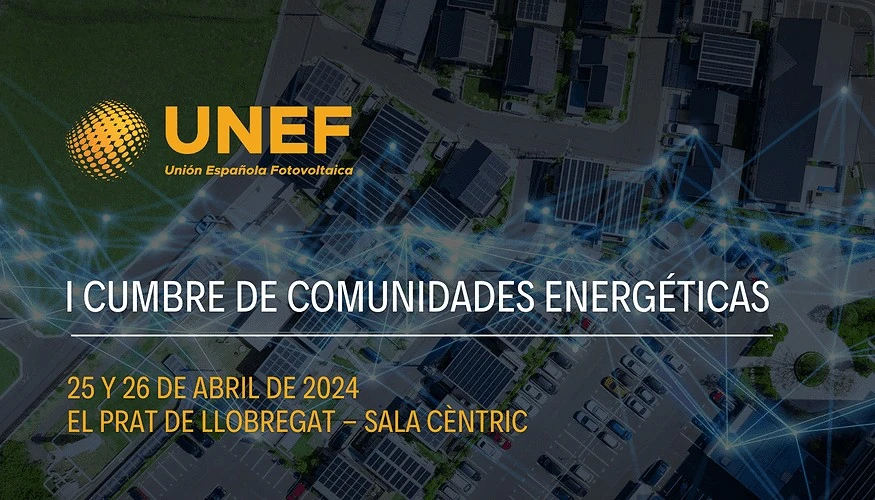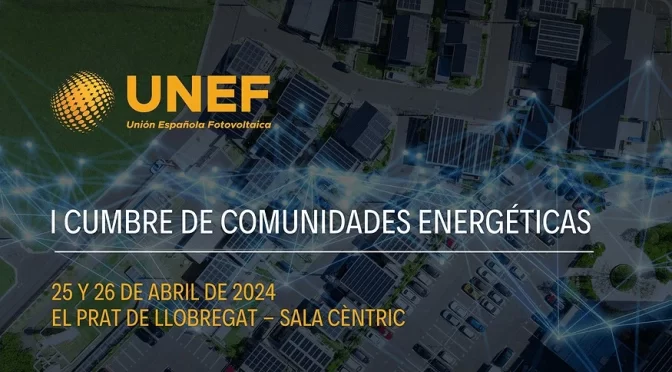On April 25 and 26, the first Energy Communities Summit will be held in El Prat de Llobregat, organized by the Spanish Photovoltaic Union (Unef) in collaboration with ComEnerSys. The meeting will bring together the main experts in the sector to share good practices and experiences in management. The debate will analyze the six barriers detected by Unef that slow down the development of energy communities in Spain.
At the event, which will take place at the Cèntric Espacio Cultural – Totes les plantes, Plaça de Catalunya, 39-41, 14 discussion tables and participation workshops will be formed to diagnose the current state of energy communities in Spain and generate proposals in terms of regulation, governance and project processing.
The institutional opening of this summit will be led by Lluís Mijoler, mayor of El Prat de Llobregat, who in turn is the president of the energy community of his municipality and who will be accompanied by the general director of Unef, José Donoso.
At the conference, organized together with the Community Energy Systems (ComEnerSys) project, specialized voices from the energy sector from different autonomous communities, research centers and representatives of the country’s main electricity companies will be heard.
“Energy communities represent a collaborative and sustainable model that we must promote and, to do so, we must strengthen information on regulation, support and share experiences between different communities. This summit serves as a meeting point to create a single voice around this important actor within the energy transition,” explains José Donoso.
At the end of the meeting, a Manifesto of the First Summit of Energy Communities and Energy Self-sufficiency will be signed to work together between communities, generate synergies and provide these groups with instruments to defend their interests.
Agenda and registration.
The six barriers that hinder the momentum of energy communities in Spain
Within its commitment to promoting a fair and sustainable energy transition, which generates real opportunities for citizens, Unef has detected the main barriers that hinder the development of energy communities in Spain.
“For Unef, energy communities represent a collaborative and sustainable model for the energy sector, allowing shared generation and efficient management of electrical energy between multiple actors,” explained José Donoso, general director of the sector association.

Therefore, in a context in which accelerating the energy transition is considered essential, and in which energy communities are a key piece, Unef has detected the six main barriers on which work must be done collaboratively between the business community and institutions. public to enhance its deployment in Spain:
Lack of time, knowledge and economic resources for the constitution of an energy community, since these imply the constitution of a legal vehicle with its own entity.
The benefits of the energy community remain largely unknown to the population. Investing in pedagogy and social awareness to inform citizens about economic savings and contributions to environmental sustainability must be a priority in the fight against the climate emergency.
For an energy community to be established, a project is needed (technological, regulated and, therefore, with a clear procedure) that may be too complex for its participants.
The energy community is a transforming agent of the territory. But for it to generate real value where it is located, it must have a character of real local integration. To achieve this, organizations with real powers are needed, which carry out mediation work so that the social integration of the project is carried out under the best standards.
The energy community is a society that has no history of payments, so it is important that the entities that finance the energy transition in Spain adapt their solvency studies to help them get off the ground.
It is necessary to develop national legislation for local energy communities, so that they can carry out all the activities that are recognized within the European directives.Currently, the sector association has developed a line of work, with which it advises people or entities that are thinking about establishing themselves as energy communities. Furthermore, all those that are already established will find in Unef a common point through which to work collaboratively with public institutions to break down these six barriers.


